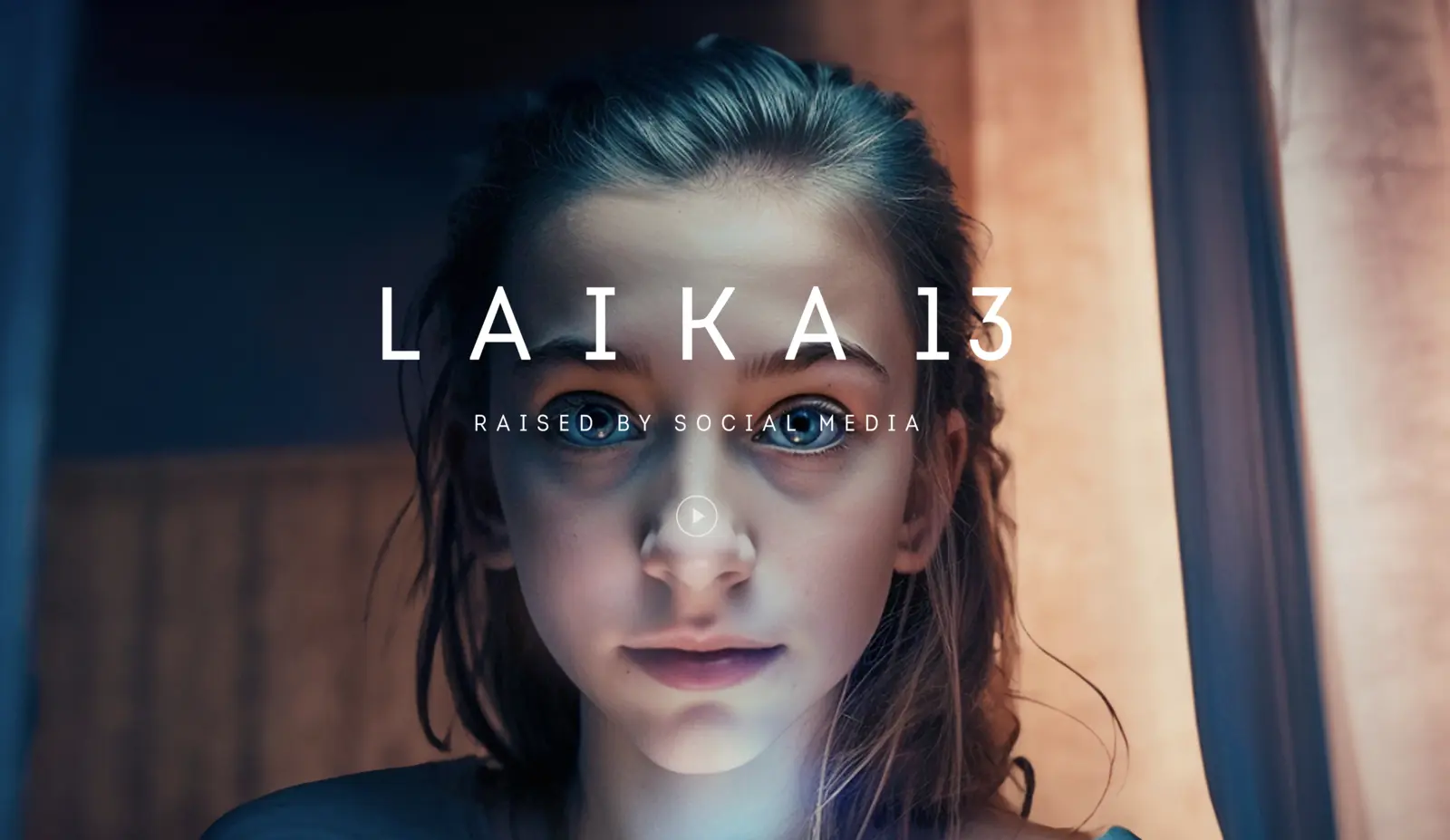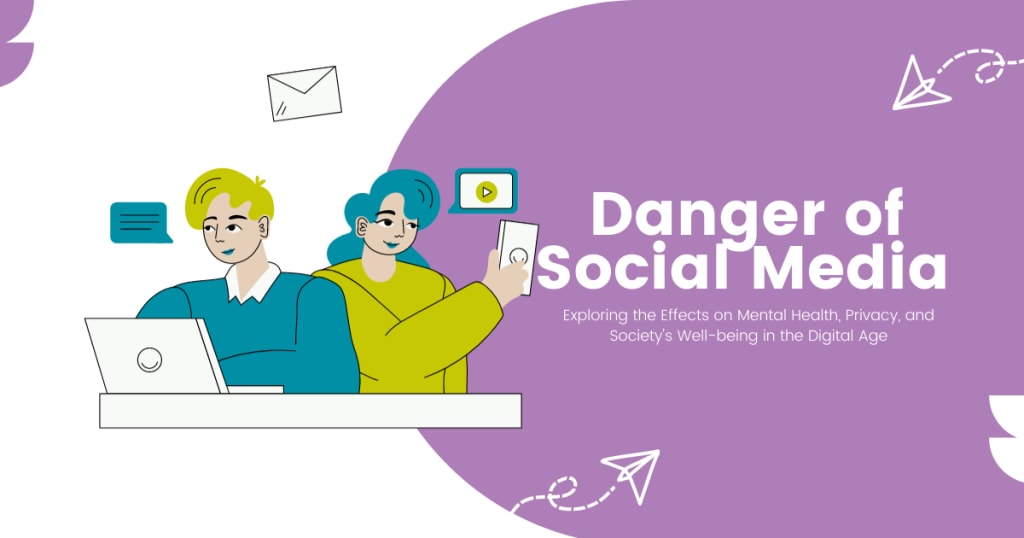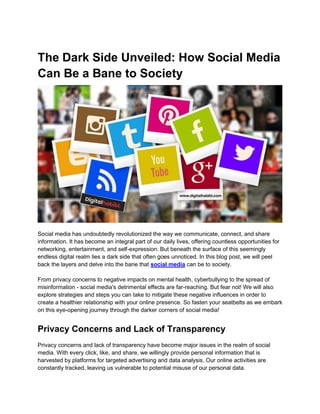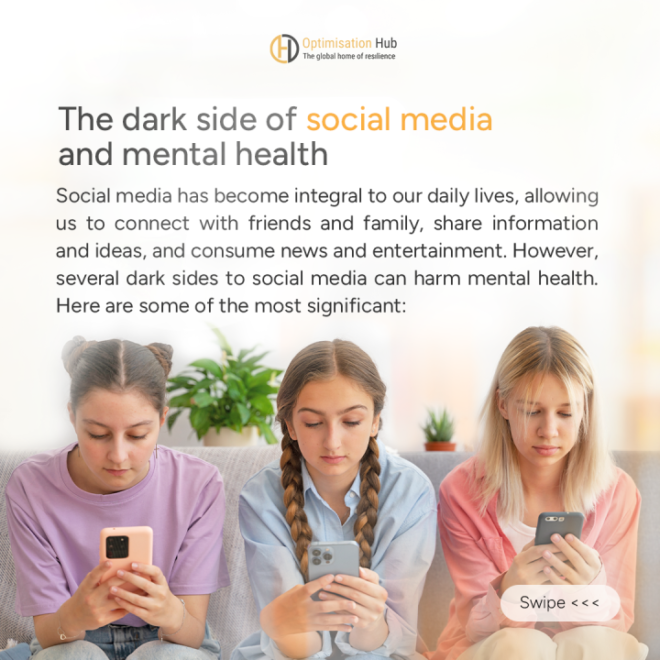How Social Media Affects Mental Health: Unveiling the Dark Side
Social media can impact mental health by causing anxiety, depression, and low self-esteem. Excessive social media use can lead to isolation and negative self-comparisons, affecting mental well-being significantly.
People often feel pressure to present an idealized version of themselves online, leading to feelings of inadequacy when comparing their lives to others. The constant need for validation and fear of missing out can also contribute to increased stress levels and decreased overall mental health.
It is essential to be mindful of the time spent on social media and its potential impact on mental well-being. In the following content, we will delve deeper into the various ways social media affects mental health and explore strategies to mitigate its negative effects.
The Impact Of Social Media On Mental Health
Social media has a significant impact on mental health, affecting individuals’ anxiety and depression. The constant exposure to curated images on platforms can lead to negative body image and lower self-esteem. Moreover, cyberbullying through social media can contribute to increased anxiety and social isolation.
Addiction And Dependency
Social media use can lead to addiction and dependency, impacting mental health negatively. Excessive screen time can contribute to feelings of isolation, anxiety, and low self-esteem. Monitoring online habits and setting boundaries is crucial for maintaining a healthy relationship with technology.
| Addiction and Dependency |
| The Dopamine Effect: Social media triggers dopamine, leading to addictive behaviors. |
| FOMO and Social Comparison: Constant comparison on social media fuels feelings of inadequacy. |
Social media impacts mental well-being through dopamine’s role in addiction and fostering FOMO. It perpetuates a cycle of seeking validation and comparison triggers negative emotions.
Negative Effects On Sleep Patterns
Excessive screen time before bed has been linked to disrupted sleep patterns, which can have a negative impact on mental health. The blue light emitted from electronic devices, such as smartphones and laptops, suppresses the production of melatonin, a hormone that regulates sleep. This can make it difficult to fall asleep and lead to restless nights. Not only does screen time affect sleep duration, but it can also impact sleep quality. Engaging with social media or other stimulating content before bed can increase mental arousal and make it harder to wind down and relax. The constant scrolling and engagement with online content can create a sense of FOMO (fear of missing out), leading to anxiety and a racing mind. To protect mental well-being, it is important to establish healthy screen habits, such as setting a technology curfew and engaging in relaxing activities before bed.

Credit: campaignsoftheworld.com
Influence On Real-life Relationships
How Social Media Affects Mental Health?
Social media has a profound impact on our real-life relationships, specifically on communication. It is evident that excessive use of social media platforms hinders face-to-face interactions, leading to a decreased ability to communicate effectively. People get so engrossed in their virtual lives that they become disconnected from the real world. The constant comparison of their lives with others on social media can create feelings of inadequacy and low self-esteem. Unrealistic expectations are often set based on the carefully curated lives portrayed on these platforms, further impacting mental health.
It is important to recognize the potential negative effects of social media on mental health and find ways to mitigate them. Limiting screen time, engaging in offline activities, and fostering real connections can help promote a healthier relationship with social media and ultimately benefit our mental well-being.
Identifying Vulnerable Populations
Vulnerable populations, including adolescents and young adults, are particularly affected by the impact of social media on mental health. It’s important to identify individuals who may be at risk, as excessive use of social media can lead to feelings of inadequacy and low self-esteem.
Recognizing these vulnerable groups is crucial in providing targeted support and intervention.
Social Media and Mental Health:
|

Credit: vocal.media
Coping Strategies And Support
Social media has become an integral part of our daily lives, but its impact on mental health cannot be underestimated. Mindful social media usage is crucial for maintaining a healthy mindset while engaging with these platforms. It is important to be aware of how social media affects our emotions and mental wellbeing.
One coping strategy is to practice digital detox and unplugging. Taking breaks from social media can help reduce stress, anxiety, and feelings of inadequacy. Professional help should also be considered if social media usage starts to negatively affect mental health. Seeking therapy or counseling can provide the necessary support to navigate the challenges of social media.
By being mindful of social media usage, taking digital detoxes, and seeking professional help when needed, individuals can better manage the impact of social media on their mental wellbeing.
Social Media Platforms’ Responsibility
Social media platforms have a significant responsibility when it comes to the impact they have on mental health. One aspect of this responsibility is the need for policies and regulations that can help protect individuals. Platforms should implement regulations that address issues such as cyberbullying and online harassment, which can have severe consequences for mental well-being. Moreover, it is essential for platforms to focus on promoting positive mental health initiatives. By collaborating with mental health organizations and professionals, platforms can provide educational resources, support communities, and helpline services to help individuals in need. Social media platforms must ensure that their algorithms and content recommendation systems are not promoting harmful content and prioritize the display of positive and uplifting posts. In summary, taking responsibility for the mental health impact of their platforms through policies, regulations, and initiatives can contribute greatly to the overall well-being of social media users.

Credit: www.slideshare.net
Promoting A Healthier Social Media Environment
Navigating a healthier social media environment involves acknowledging the impact on mental health. Understanding how social media affects mental well-being can lead to strategies that promote positive usage and minimize negative effects on individuals. Encouraging mindful and purposeful engagement on social platforms can help mitigate potential harm.
| Social media platforms impact mental health by influencing self-esteem and overall well-being. Users can feel overwhelmed due to constant comparison with others and negative content. Engaging with supportive communities and promoting positive discussions can help create a healthier online environment. Encouraging users to share inspiring stories and providing resources for mental health awareness can make a difference. Advocating for online safety and creating safe spaces for open dialogue is crucial in addressing the negative impacts of social media. By fostering a community that values mental well-being and emotional support, we can work towards a more positive and nurturing online space. |
Frequently Asked Questions On How Social Media Affects Mental Health?
How Social Media Is Affecting My Mental Health?
Frequent social media use can negatively impact mental health by increasing anxiety and depression levels. Comparisons, cyberbullying, FOMO, and screen time contribute to these effects.
What Are 5 Negative Things Social Media Does?
Social media can lead to addiction, cyberbullying, privacy issues, mental health problems, and misinformation.
How Can Social Media Cause Anxiety?
Social media can cause anxiety due to the constant comparison with others, fear of missing out, and cyberbullying. People often feel pressured to present a perfect image, leading to self-esteem issues and anxiety. Additionally, the never-ending notification cycle can contribute to a sense of overwhelm and stress.
Does Social Media Cause Loneliness?
Social media can contribute to feelings of loneliness due to excessive screen time and comparison. It impacts personal interactions.
Conclusion
In a digital age, social media impacts mental health significantly. Establishing boundaries and self-care are crucial. Remember, moderation is key when engaging with online platforms. It’s essential to prioritize mental well-being over virtual validation. Stay mindful of your social media consumption for a healthier mindset.
